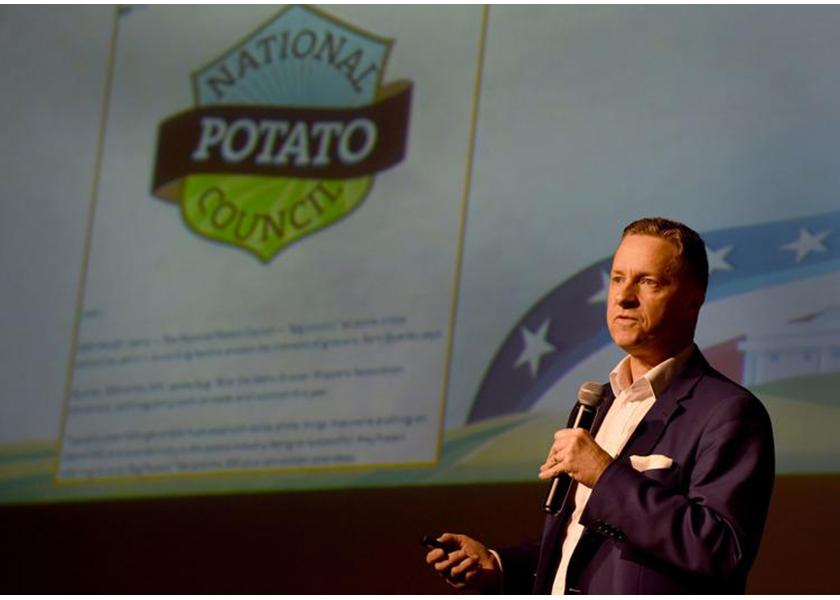Simple questions about devastating disease require transparent answers

For the second time in under 12 months, the North American potato industry received news that no one wanted: more detections of the devastating potato wart disease found in fields in Prince Edward Island (PEI), Canada. These detections occurred just seven months after exports of seed potatoes between PEI and the United States had restarted after an October 2020 outbreak in seed potato fields caused their suspension.
The response last month by both the Canadian Food Inspection Agency (CFIA) and the U.S. Department of Agriculture (USDA) was rapid. The technical experts in both agencies agreed that protections for all other Canadian provinces would be instituted and those for the U.S. would be reinstated and expanded. As these new detections this year occurred in processing fields, the U.S. export suspension would be broadened to include all fresh potatoes until comprehensive surveys could be conducted and the data analyzed by both countries.
These actions are entirely reasonable and in proportion to the threat of potato wart to the industries of both countries. Canada has a long history in dealing with such devastation. Beginning in the early 1900s, this very disease became so widespread in Newfoundland that potatoes grown there today still cannot be moved outside its borders to protect the rest of the country.
Secretary Tom Vilsack and his team at USDA should be commended for working with CFIA in instituting a pause in exports to the U.S. to fully understand the situation with this important trading partner and hopefully resume trade in a way that addresses the risk. His statement immediately following CFIA’s order said exactly that, and the U.S. potato industry stands behind those actions.
Certainly, this news has not been welcomed by those impacted. Quarantines have been instituted numerous times around the world in the face of disease threats and each time those growers are vocal in their opposition. Claims that this action is part of a “trade war” with the U.S. have been made very loudly in the local media in PEI. However, those political statements are not supported by any reasonable understanding of how trade wars work.
First, a trade war requires one country to benefit from the action.
In this case the U.S. potato industry – particularly individual U.S. growers who rely on PEI for their annual seed supply -- is harmed by the lack of access to seed and other fresh potatoes from PEI.
Second, a trade war is a dispute between two countries.
In this case, CFIA’s self-imposed action includes protections for all the other provinces of Canada to prevent the spread of potato wart throughout their own country, along with limiting what can be shipped to the United States. Both actions are consistent with Canada’s intention to minimize a disease spread.
It should be noted that the PEI seed outbreak last year was “resolved” by CFIA after just five months of investigation and without determining a cause. The U.S., at that time, then allowed trade to resume based on the lack of clear evidence of the presence of wart. However, the additional rapid detections of potato wart in the last month paint a picture of disease spread that warrants a different response this year.
Given the evolving situation, an efficient resolution requires transparent answers to some simple questions.
Number one: How widespread is the disease in PEI?
As has been indicated by CFIA, the soil sampling program on PEI for potato wart has decreased by roughly 75 percent over the past five years. Without that type of analysis, there is no comprehensive base of information to understand the disease spread. In the absence of rigorous testing, visual inspections are the fallback method, but they come with vastly less efficacy. Even more troubling, despite the reduction in soil testing, disease detections are accelerating.
And question number two: What is Canada and PEI going to do to improve the situation based on the data they receive?
Comprehensive soil sampling tests need to be reinstated as quickly as possible at a vastly larger scale than five years ago. Based on the results of those surveys, the technical experts can determine what improvements are necessary in the PEI potato wart program to reverse this trend of detections, minimize risk and hopefully restart shipments to the rest of Canada and the U.S. consistent with the science.
The U.S. industry has dealt with numerous phytosanitary issues over the years and fully understands the difficult situation the PEI growers and their entire industry are facing. Our industry has conveyed to U.S. officials our desire to restart trade safely and efficiently with this important partner, but only once clear answers are provided on how the disease is progressing and what transparent steps are being taken to minimize its threat to the rest of Canada and the United States.
The U.S. potato industry appreciates CFIA for acting quickly and recognizing this dire threat to the U.S. and Canadian potato industries. We are committed to working collaboratively with USDA, CFIA, and the Canadian potato industry to ensure that the science is followed so we can resume normal trade that benefits growers, workers, industry partners, and local communities on both sides of the border.
- Kam Quarles is CEO of the National Potato Council.







